- Just Transition
- Project Finance
- Siting & Permitting Reform
- Sustainable Investing & ESG
- Tax Incentives & Appropriations
- Trade & Supply Chain
- Transmission & Power Markets
- Workforce
- Blog
The 2024 ACORE Awards Gala and Signature Forums United the Clean Energy Sector in Washington, D.C.

At the end of February, the American Council on Renewable Energy (ACORE) team hosted our Accelerate Forum, Awards Gala, and Policy Forum, which gathered hundreds of attendees to celebrate a year of major progress for the clean energy transition and highlight pathways to navigate remaining challenges.
ACORE Accelerate Forum
The week’s events began Wednesday, February 28, with the ACORE Accelerate Forum at Amazon’s HQ2 in Arlington, Virginia, where the fourth cohort of companies were officially welcomed into the ACORE Accelerate Membership Program. Accelerate members met with program sponsors, alumni, ACORE board members, staff, and other supporters to identify opportunities for collaboration and engagement.
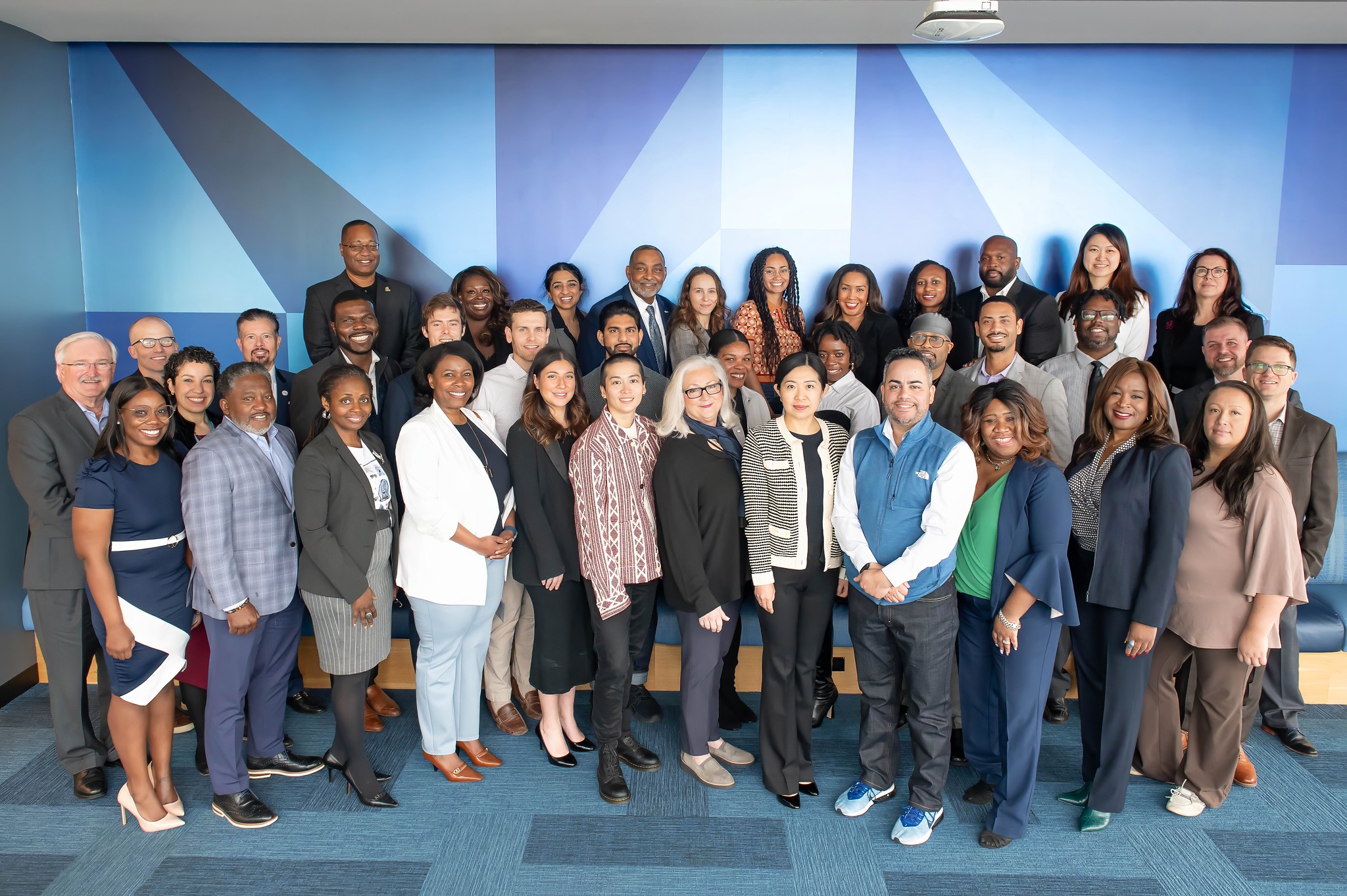
ACORE Awards Gala
Later that evening, ACORE hosted a sold-out crowd of clean energy executives at Union Station for our annual Awards Gala. ACORE presented Renewable Energy Champion Awards to two of America’s leading advocates for clean energy, Rep. Sean Casten (D-IL) and Rep. Mariannette Miller-Meeks (R-IA). Keynote remarks were provided by House Minority Leader Rep. Hakeem Jeffries (D-NY), ACORE’s Board Chair Kevin Gresham of RWE Clean Energy, ACORE Accelerate alumni Monique Dyers of Ensight Energy Consulting, and ACORE President and CEO Ray Long.

Welcome from ACORE President and CEO Ray Long
In his first ACORE Awards Gala and Policy Forum since joining the organization, ACORE President and CEO Ray Long put forth a goal the entire clean energy sector can rally behind: to deliver affordable, reliable, and clean power for all Americans.
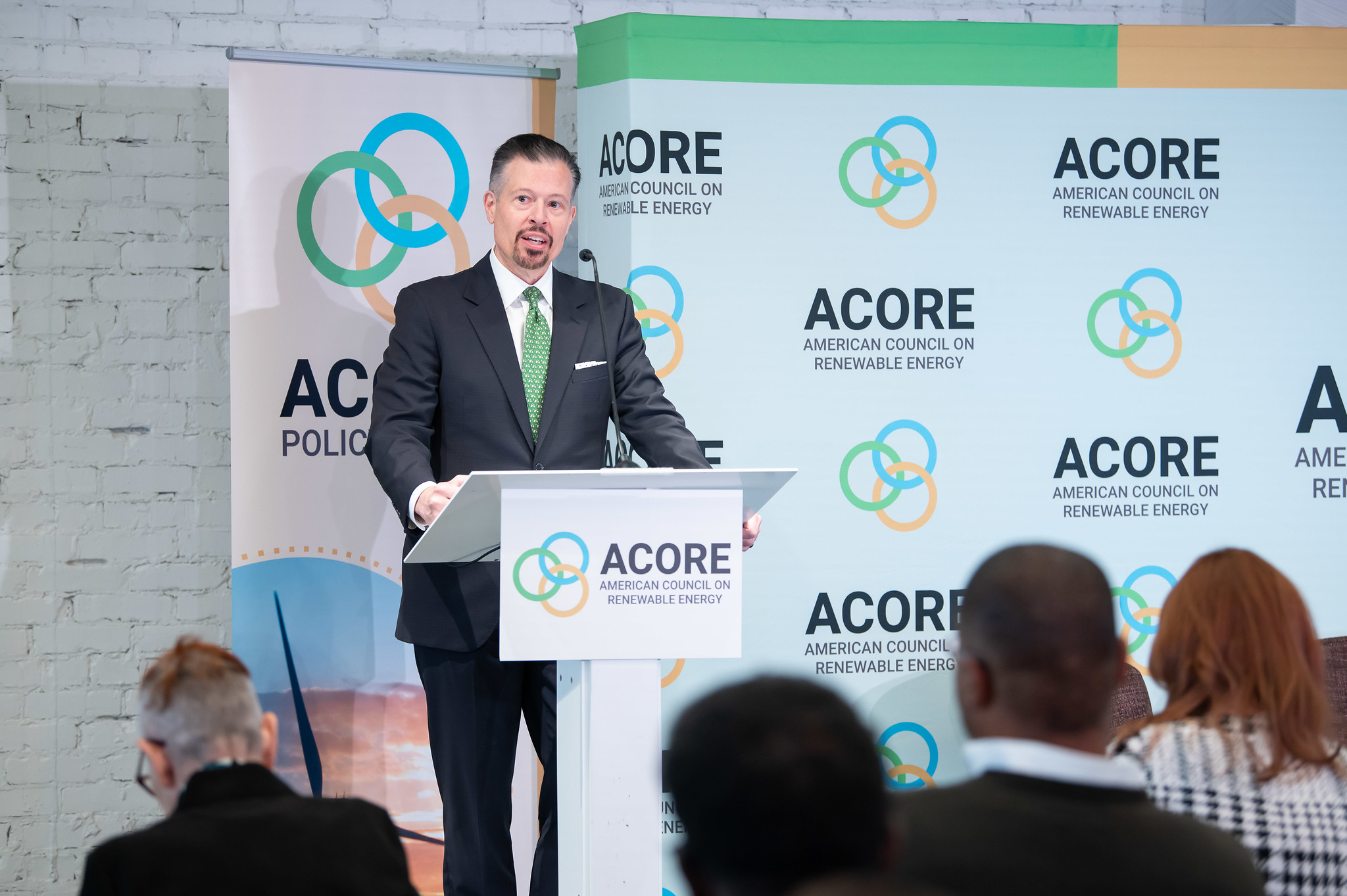
Long also emphasized that the energy transition is progressing across the American economy despite the challenges the industry is working to address. “Investors are financing clean energy across the U.S. Developers are building clean energy. Customers from businesses of all sizes to households are buying clean energy,” Long told the crowd.
Keynote Remarks from U.S. Senator Sheldon Whitehouse
With many bills to support the clean energy transition gaining momentum in Congress, Sen. Sheldon Whitehouse (D-RI) identified some of the upcoming legislative efforts that could move forward this year.
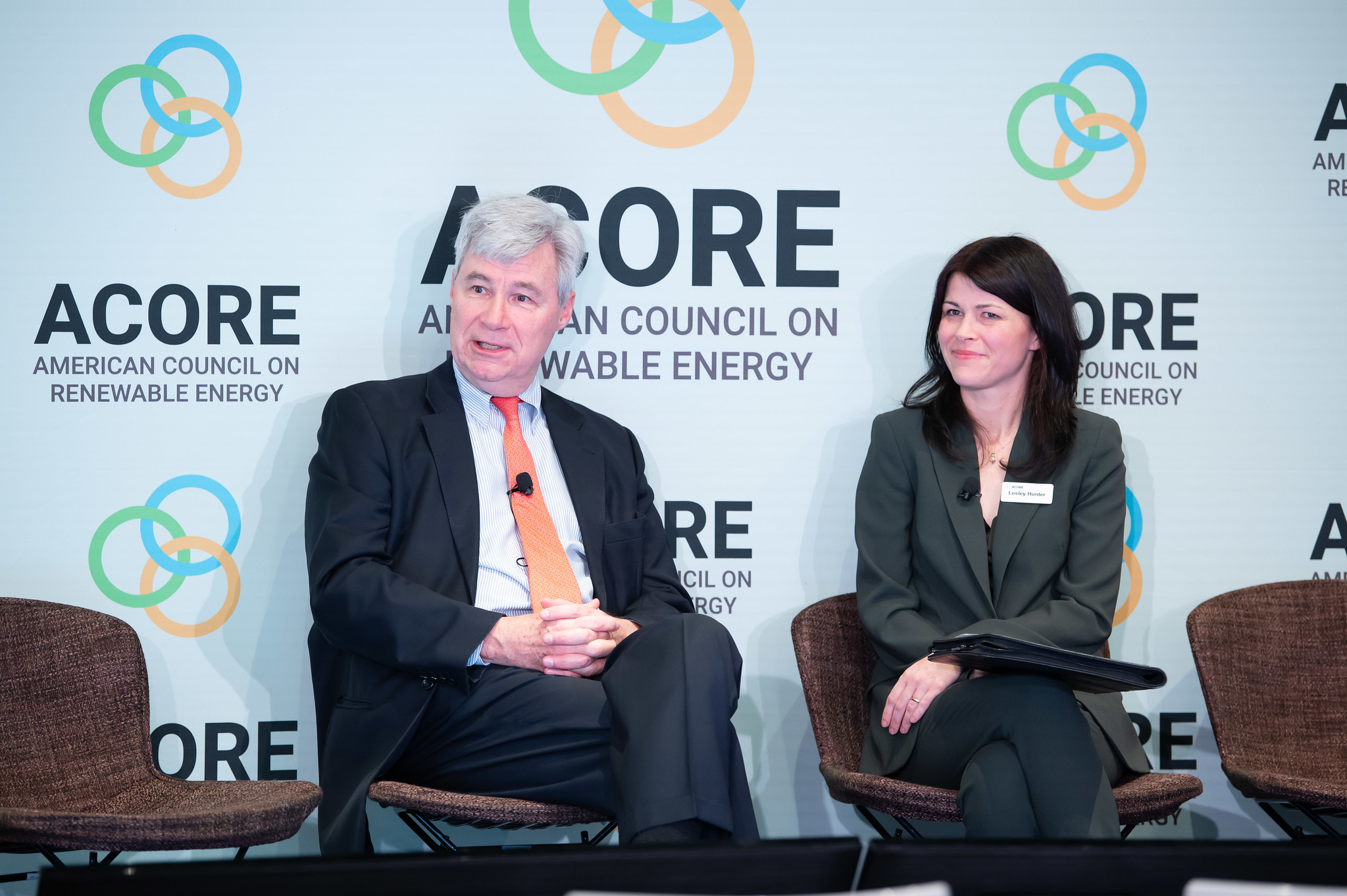
He conveyed that he and Sen. Martin Heinrich (D-NM) are working to reconcile their two bills to accelerate the siting and permitting of transmission, the SITE Act and the FASTER Act. Sen. Whitehouse also discussed the draft of the COLLABORATE Act, which he released in January, noting the intent of the law is to “streamline the [offshore wind permitting] process, front load disputation, and bring in the room people who are going to be affected.” When asked about the Inflation Reduction Act (IRA), he called it a “terrific success,” citing research from Goldman Sachs to underscore that the “usage of tax benefits is going to be as much as three times what we anticipated.”
Optimizing Investment Potential: Maximizing the IRA Amid Financial Challenges and Opportunities
Reflecting on the state of IRA tax implementation guidance from the Treasury Department, the first panel of the 2024 ACORE Policy Forum agreed that important questions remain unresolved, but expressed optimism that the clearest rules are already enabling early transactions.
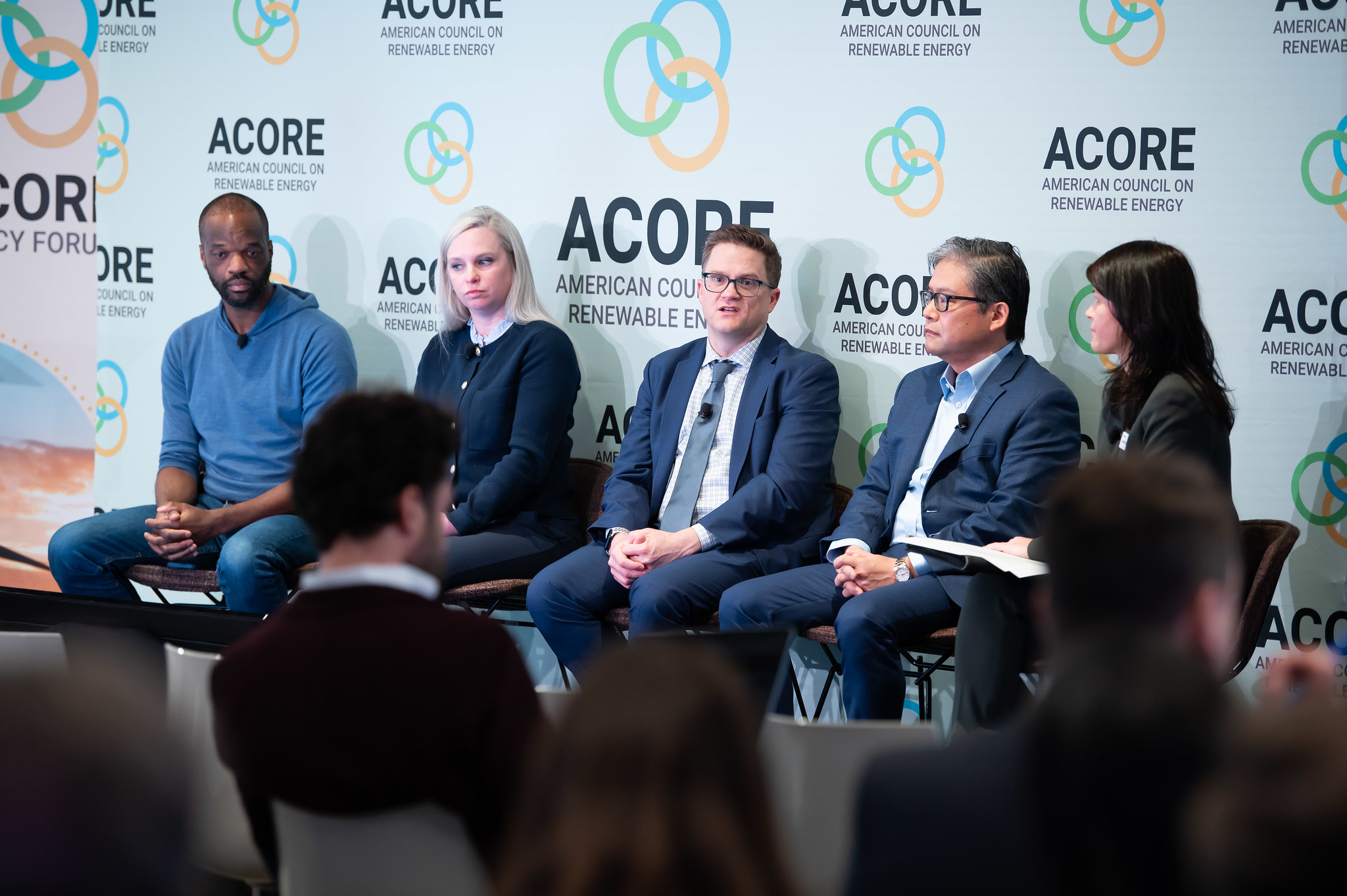
On transferability, the panel underscored how this game-changing mechanism is poised to multiply renewable energy finance. Speakers indicated that transferability provides valuable market liquidity even for companies that focus on traditional tax equity to capture benefits that transferability does not offer, such as the ability to monetize depreciation. On transferability and traditional tax equity, the panel underscored the need to attract new investors, such as through education on the low-risk nature of such investments and their inherent “additionality” for corporations seeking ESG credit, and by addressing regulatory and accounting issues limiting such investments. The panel also discussed the need to advance energy equity by prioritizing investments in disadvantaged areas and harnessing the expertise of local community organizations through a bottom-up approach.
Keynote Remarks from Chair Brenda Mallory, White House Council on Environmental Quality (CEQ)
Chair Mallory began her remarks by acknowledging “everyone in this room, in particular, has a role to play” in helping achieve the Biden administration’s clean energy and environmental justice goals. Chair Mallory stated that “President Biden is unquestionably delivering a clean energy economy,” citing that more than $200 billion has been invested in the clean energy economy by the private sector since the IRA was passed. Mallory also highlighted how the theme of an “all-of-government effort” is a mantra for the administration when it comes to decarbonizing.
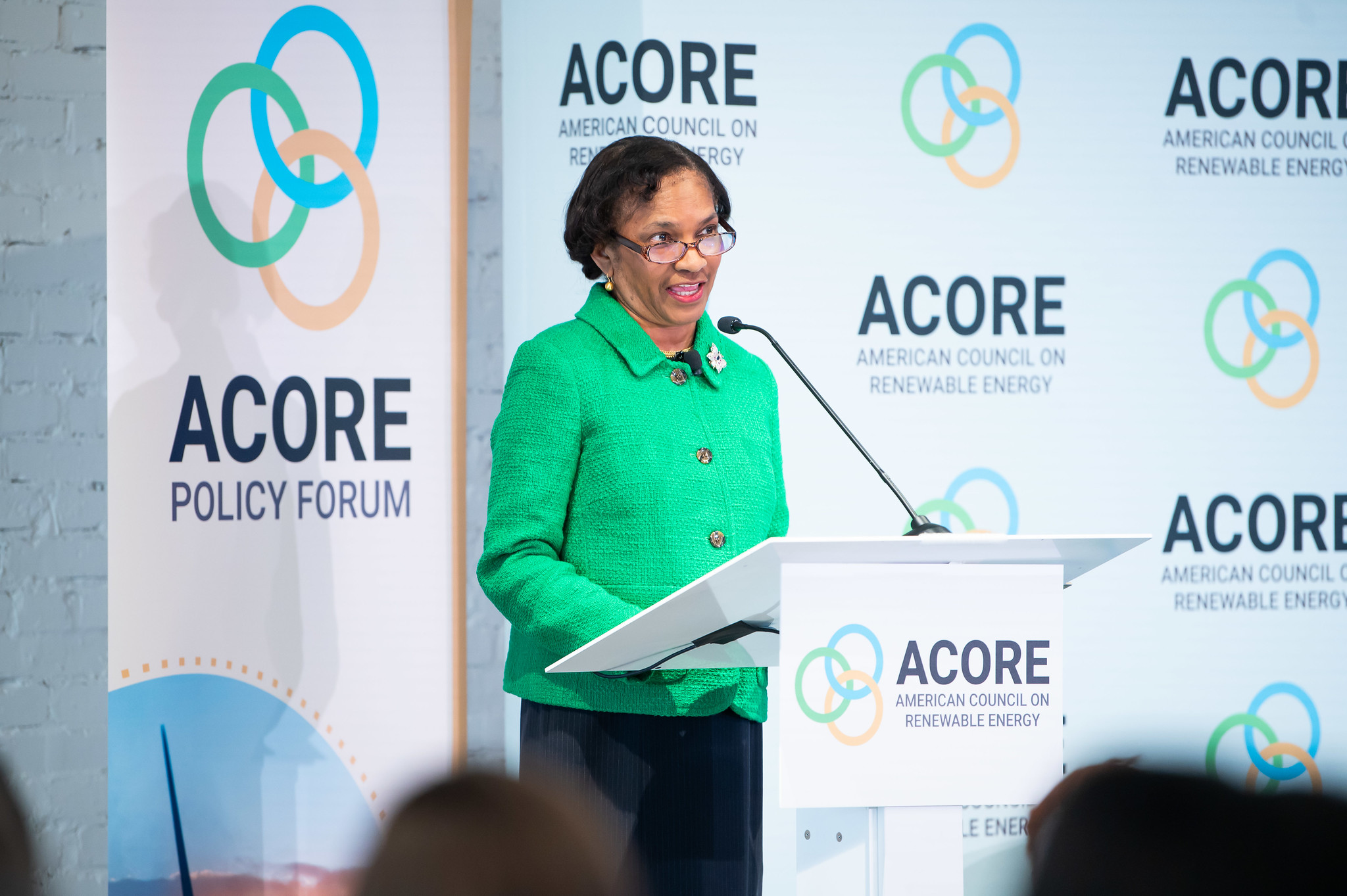
Addressing siting and permitting issues, Chair Mallory echoed the sentiments of many other Policy Forum speakers on the need to “modernize and accelerate” these processes. She emphasized the importance of stakeholder input, clear timelines, and environmental justice for environmental reviews. Chair Mallory also referenced funding allocated for research and development in the IRA and the Bipartisan Infrastructure Law (BIL) as a way to bring in new tools to expedite the permitting process.
Defending the IRA: 2024 Uncertainties and Threats
Bringing perspectives from both sides of the aisle, the second panel at the 2024 Policy Forum exemplified bipartisan support for the benefits of the IRA. While speakers agreed the political rhetoric surrounding the law can sometimes be unhelpful, speakers highlighted how the law’s core aspects and early returns – concentrated in predominantly rural and conservative districts – transcend party affiliation.
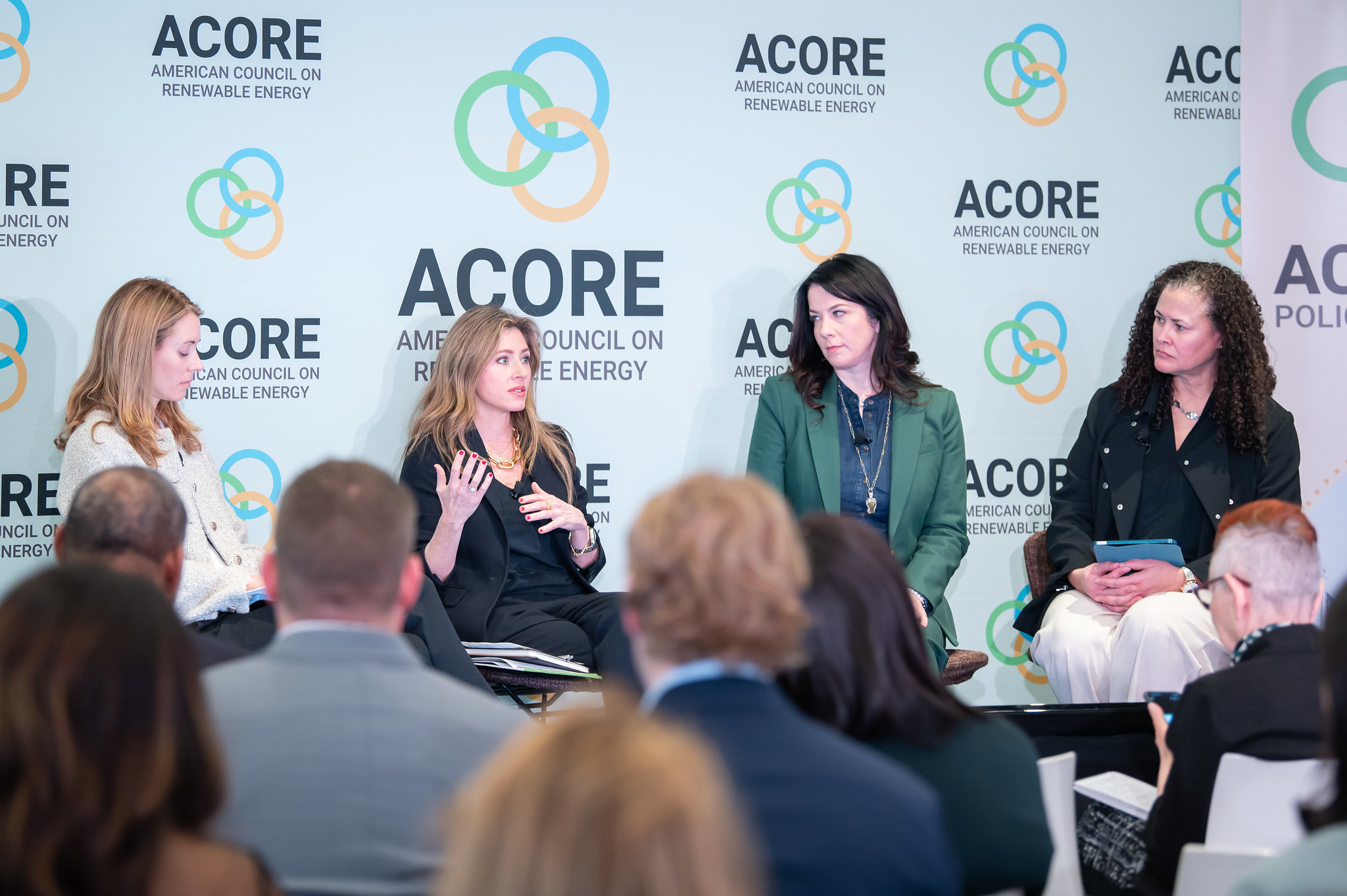
For these reasons, the panel could not envision a wholesale repeal of the IRA, even as the outcome of upcoming general elections remains difficult to predict. While speakers offered varying perspectives on the threat of direct rollbacks, the panel mentioned that legislative vehicles for such attempts are fast approaching ahead of the debt ceiling cliff and expiration of 2017 Tax Cuts and Jobs Act provisions in early 2025. Invenergy’s Kelly Speakes-Backman noted that reductions in federal agency appropriations and the addition of bureaucratic red tape are also salient threats to the law. Forthcoming legislation is also an opportunity to play “offense over defense,” added Sarah Hunt of the Joseph Rainey Center for Public Policy. A potential bipartisan tax extenders package could help advance a standalone transmission tax credit, for example. Berkshire Hathaway Energy’s Melissa Burnison identified this as a top priority to lower the financial hurdles to long-distance, high-voltage transmission lines, which lawmakers are also targeting as part of a long-awaited agreement on siting and permitting reform.
Balancing Act: Securing the Supply Chain and Accelerating Low-Cost Renewables Deployment
The domestic production of essential clean energy components is a goal that the industry is eager to work toward, declared this panel, which also acknowledged that onshoring critical supply chains is a long-term process that will require the right combination of trade policies. Speakers expressed encouragement at the initial offtake for manufacturing credits, such as the section 45X Advanced Manufacturing Production Credit and section 48C Advanced Energy Project Credit Program.
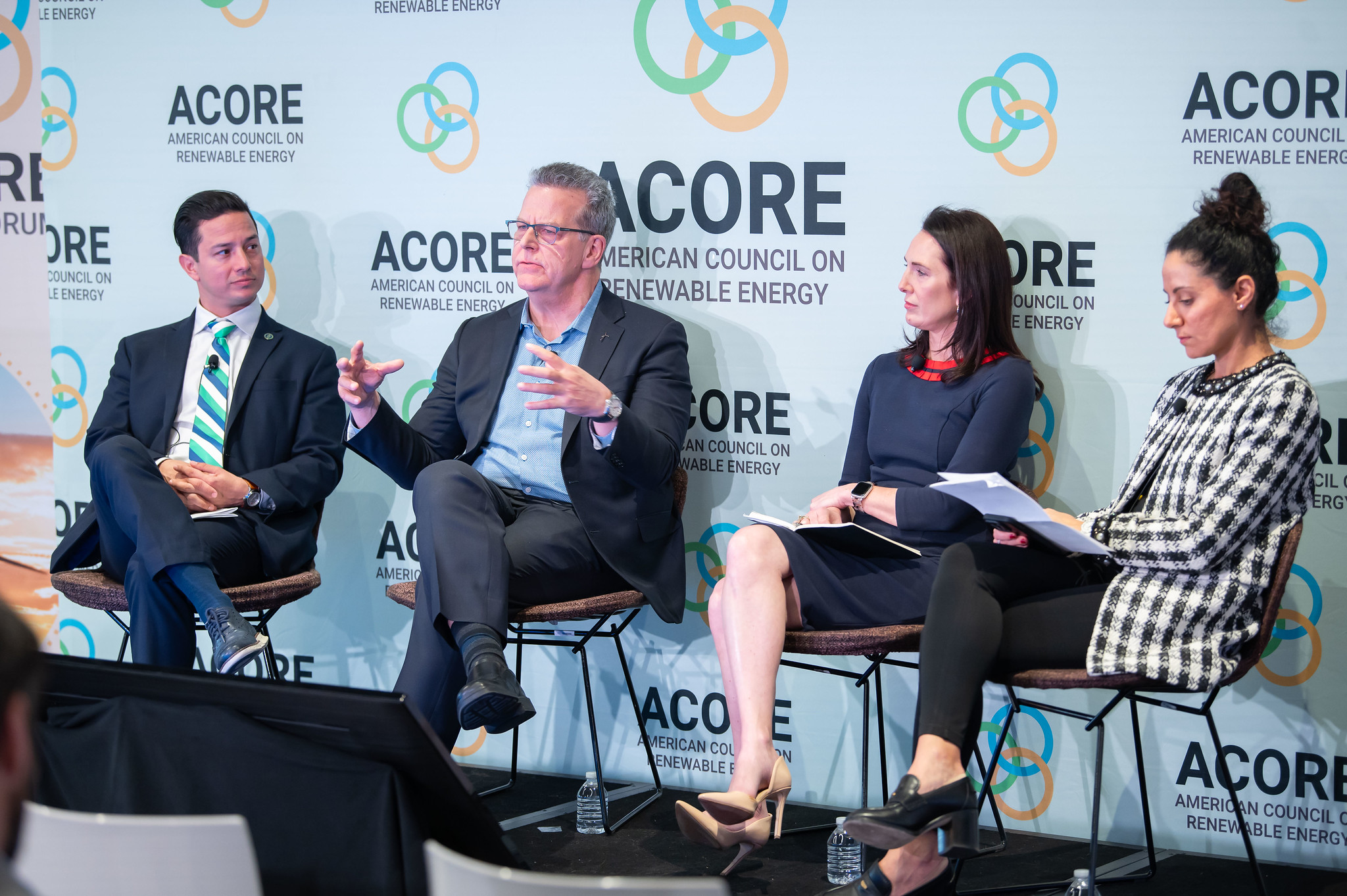
At the same time, the panel was realistic about the gaps that remain. “The IRA helped us,” said EDP Renewables North America’s Tom Starrs, “but it did not quite get us where we need to go.” Panelists expressed that balancing supply and demand signals is essential for private companies confronting a “perfect storm of uncertainty,” much of which stems from the prospect of new trade tariffs. The panel added that DOE’s efforts to “friend shore” domestic energy manufacturing in coordination with the Department of Commerce are crucial, particularly to help fulfill urgent equipment procurement imperatives.
Cultivating an Equitable Clean Energy Workforce: Strategies for Meeting Demand and Building Talent
By tying the full value of certain clean energy incentives to historic prevailing wage and apprenticeship requirements, the IRA has helped cement workforce development as a pillar of the clean energy transition. With 3 million new jobs estimated to be created annually by the IRA, BIL, and CHIPS and Science Act, 70% of which are available to individuals without a college degree, the law is part of a “generational opportunity to build up a blue-collar middle class,” observed Jason Walsh of BlueGreen Alliance. At the same time, panelists cautioned that the IRA is not a silver bullet, having been enacted without additional funding to support registered apprentice training programs and other supportive measures included as part of the Build Back Better Act. They agreed these measures are key to an intentional workforce strategy that is needed moving forward.
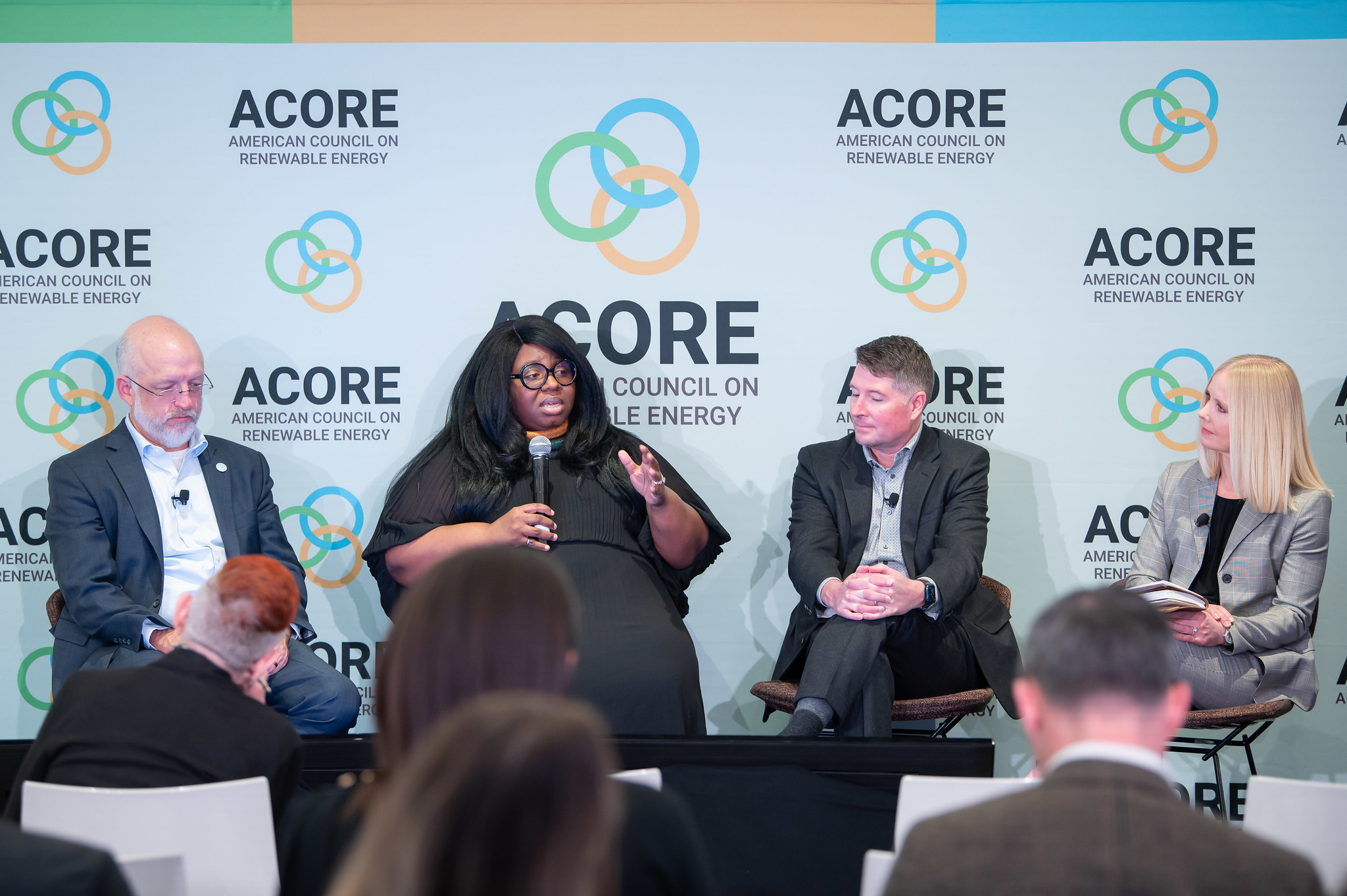
Panelists also emphasized the new demand for skilled labor as an opportunity to develop a more diverse workforce. Breaking apart occupational segregation by race and gender includes leaving behind traditional understandings of what a clean energy job should look like, noted Reactivate’s Utopia Hill. Hill explained the importance of focusing on the untapped talent in low- and moderate-income communities through training programs with a direct pathway to jobs, wraparound services, and family-sustaining wages. The clean energy sector also has an opportunity to provide superior career experiences for workers in the fossil fuel industry, which will help alleviate the fears of communities afraid of being left behind in America’s energy future.
Keynote Remarks from Liz Klein, Bureau of Ocean Energy Management (BOEM) Director
BOEM’s Liz Klein set the tone for her remarks by calling attention to the destructive impact that increasing extreme weather events are having on communities in the U.S. and around the world, while urging swift action to deploy climate solutions like clean energy. Despite the recent headwinds that the U.S. offshore wind sector has faced, Klein said that BOEM is “laying the foundation for an offshore wind energy program that is built to endure.”
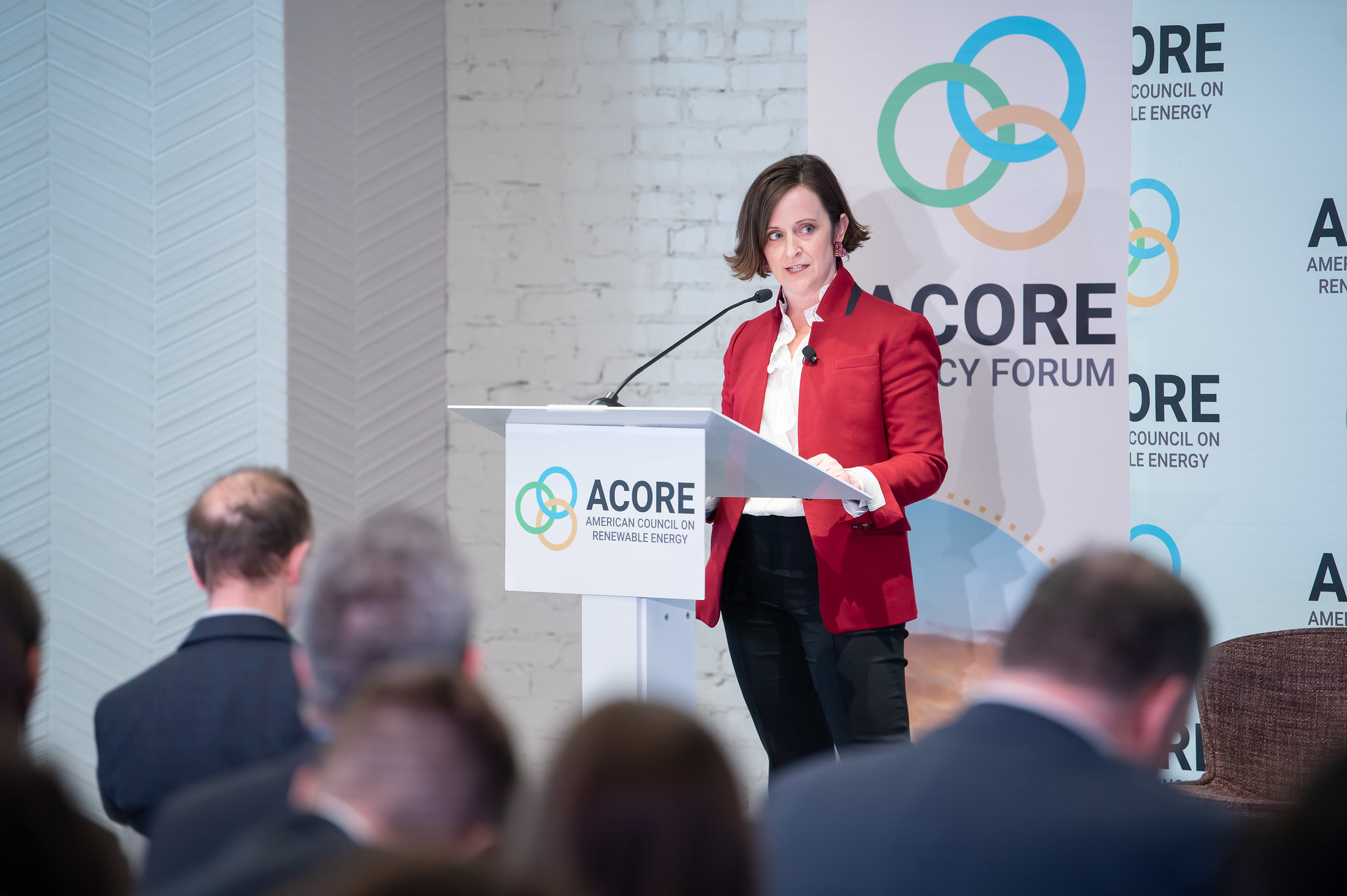
She pointed to several significant milestones as a sign of progress, including four lease sales held in this administration alone, billions invested by industry for manufacturing and port facilities, and new vessels for equipment transportation. Klein confirmed that BOEM plans to hold four more offshore wind lease sales in the Gulf of Maine, Gulf of Mexico, the Central Atlantic, and off the coast of Oregon. She also discussed the importance of transmission as “a key piece of the offshore wind puzzle,” touching on BOEM’s work to assist in identifying offshore transmission planning needs.
Expanding and Optimizing the Transmission Grid: Meeting Demands for Reliability, Affordability, and Clean Energy Integration
The last panel at the 2024 ACORE Policy Forum described a new challenge for transmission: as demand increases to accommodate fast growth both in terms of new load and economic investments, so will the work necessary to coordinate that buildout. A current research initiative at the Department of Energy’s Grid Deployment Office (GDO) seeks to help tackle that challenge by examining the must-build solutions to address interregional transmission constraints, which “jumped off the page” in the 2023 National Transmission Needs Study, remarked GDO’s Jeff Dennis. Alleviating these constraints will improve system-wide reliability and help customers recover hundreds of millions of dollars in lost energy savings each year, he added.
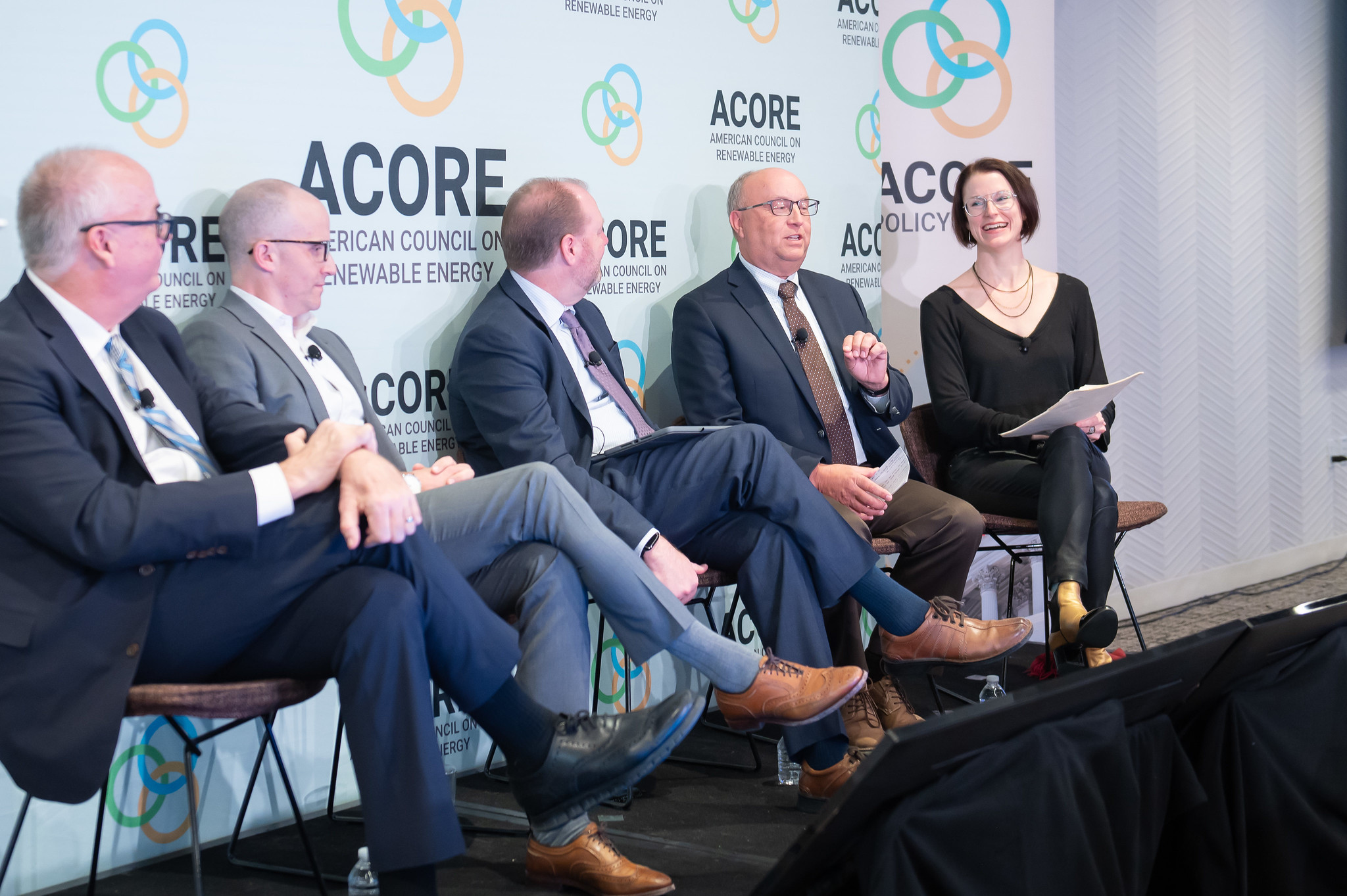
The panel also explored exciting developments in emerging technologies. Data solutions customized for utilities have helped collapse the timeline for power flow studies from “months down to hours,” said Amazon Web Services’ Nate Hill, representing just the start of what artificial intelligence and exascale computing can do to optimize grid operations. Speakers also underscored the importance of Grid Enhancing Technologies – a popular, bipartisan solution mentioned throughout several panels at this year’s Policy Forum – that can help quickly and cost-effectively maximize the existing capacity of the grid.
On behalf of the ACORE team, thank you to all who were able to join us at this year’s Accelerate Forum, Awards Gala, and Policy Forum, with a special appreciation to our sponsors that made the event possible. A gallery of photo albums from the events can be viewed here. This summer, ACORE is excited to host our Finance Forum on June 4-5 in New York City. We hope you’ll join us there.
Authors

ACORE Team Member

ACORE Team Member
Join leaders from across the clean energy sector.

What will our next 20 years look like? Here’s the truth: they’ll be better with ACORE at the forefront of energy policy.
Shannon Kellogg
Amazon Web Services (AWS)
